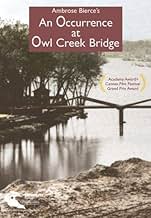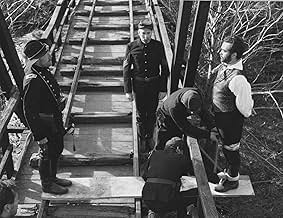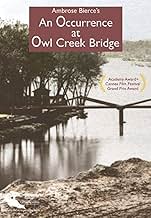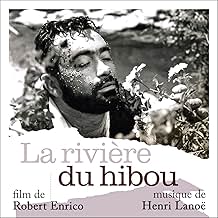IMDb RATING
8.1/10
4.4K
YOUR RATING
In 1862, during the American Civil War, a Southern civilian is about to be hanged for attempting to sabotage a railway bridge. When the execution takes place from the bridge, the rope breaks... Read allIn 1862, during the American Civil War, a Southern civilian is about to be hanged for attempting to sabotage a railway bridge. When the execution takes place from the bridge, the rope breaks and he begins his escape toward home.In 1862, during the American Civil War, a Southern civilian is about to be hanged for attempting to sabotage a railway bridge. When the execution takes place from the bridge, the rope breaks and he begins his escape toward home.
- Director
- Writers
- Stars
- Won 1 Oscar
- 3 wins total
- Director
- Writers
- All cast & crew
- Production, box office & more at IMDbPro
Featured reviews
I cannot believe that this film is remembered by more than myself! I was a young teenager waiting for the main picture to start when this small black and white movie was shown as a filler. Forty years later, I can still remember the impact this film had on me. It was stunning! It reached me in such a way, that I have never forgotten it, and it was this film that started my love of cinema..Real cinema!
Over the years, I have mentioned this movie to many people, none of whom have even heard of it, I thought I'd imagined it all..! It was also the film that had me wishing I could work in the movies.... Forty years on, I still have that same dream! Silly isn't it?
Over the years, I have mentioned this movie to many people, none of whom have even heard of it, I thought I'd imagined it all..! It was also the film that had me wishing I could work in the movies.... Forty years on, I still have that same dream! Silly isn't it?
This film is chilling, yet absolutely wonderful. One cannot help but to have sympathy for the convicted man. The beauty of nature is displayed quite perfectly in his cute musical number; the sunlight plays wonders with the camera despite the film being in black and white. There is hardly any dialogue to clutter up the message, only one man's struggle to live. The ending is amazing and will leave the viewer's jaw agape. This film is even better than the original short story. Recommended viewing for anyone who craves a short movie that is long on depth.
BUYER BEWARE!
This short film is only one part of a three-story anthology film by Robert Enrico called "Au coeur de la vie" (1962) (please see elsewhere in IMDb). All three stories are inspired by Ambrose Bierce short stories about the American Civil War.
Something very strange happened to this particular episode of "Au coeur de la vie" (whose title is the translation of Ambrose Bierce's collection of short stories "In the Midst of Life"). First of all, it was proposed as Best Short Subject at the Oscars in 1962 and won, even though it had probably never been shown commercially that way in the US or anywhere else. Second, it was chosen as the very last episode of Rod Serling's TV series "The Twilight Zone", in a cost-cutting gesture.
It is this truncated version that is generally available on VHS and DVD today. It is unfortunately not the way its director wanted it and the two other episodes of that film ("L'oiseau moqueur" and "Chickamauga", a.k.a. "La Bataille de Chickamauga") have totally disappeared from everyone's consciousness.
That is really sad as I remember seeing the whole film in a cine-club in 1963 and going through a thoroughly gut-wrenching emotional experience because of the cumulative effect of these three stories. For the record, "L'Oiseau moqueur" ("The Mockingbird") tells of the terrifying confrontation of two brothers on a battlefield and "Chickamauga" relates the famous battle from the point of view of a six-year-old deaf and mute child living on a plantation.
Some producer somewhere probably decided that the entire film would be too intense to be shown in its entirety to an American audience and it has since sunk under the waters of forgetfulness, except for that maimed "Twilight Zone" episode, edited for the inclusion of commercials.
Let us all pray that somebody, somewhere will rescue it from the ravages of time before it is too late and make the whole thing available on DVD, in its original, uncut, uncompromised form, very, very soon
This short film is only one part of a three-story anthology film by Robert Enrico called "Au coeur de la vie" (1962) (please see elsewhere in IMDb). All three stories are inspired by Ambrose Bierce short stories about the American Civil War.
Something very strange happened to this particular episode of "Au coeur de la vie" (whose title is the translation of Ambrose Bierce's collection of short stories "In the Midst of Life"). First of all, it was proposed as Best Short Subject at the Oscars in 1962 and won, even though it had probably never been shown commercially that way in the US or anywhere else. Second, it was chosen as the very last episode of Rod Serling's TV series "The Twilight Zone", in a cost-cutting gesture.
It is this truncated version that is generally available on VHS and DVD today. It is unfortunately not the way its director wanted it and the two other episodes of that film ("L'oiseau moqueur" and "Chickamauga", a.k.a. "La Bataille de Chickamauga") have totally disappeared from everyone's consciousness.
That is really sad as I remember seeing the whole film in a cine-club in 1963 and going through a thoroughly gut-wrenching emotional experience because of the cumulative effect of these three stories. For the record, "L'Oiseau moqueur" ("The Mockingbird") tells of the terrifying confrontation of two brothers on a battlefield and "Chickamauga" relates the famous battle from the point of view of a six-year-old deaf and mute child living on a plantation.
Some producer somewhere probably decided that the entire film would be too intense to be shown in its entirety to an American audience and it has since sunk under the waters of forgetfulness, except for that maimed "Twilight Zone" episode, edited for the inclusion of commercials.
Let us all pray that somebody, somewhere will rescue it from the ravages of time before it is too late and make the whole thing available on DVD, in its original, uncut, uncompromised form, very, very soon
10I_KODA
Incident at Owl Creek Bridge is an excellent movie. My Mom saw this movie years ago when it was first shown on t.v. and it left an indelible mark on her. I remember how spellbound us kids were as she told the story to us...My hair stood on end. Mom has been wanting to find it and I just looked here, hoping... and voilà, here it was listed. Although it may be an old movie, the acting and the subject matter would appeal to a broad range of ages. There was so much suspense within us kids as Mom recounted the movie that we were totally silent and still, listening raptly, wide eyed and tense.We felt as though we were right there watching it. Years later, I finally saw it and it was just as my Mom had described.I highly recommend this one and so does my family.
When I saw the movie Brazil in 1986, I had a nagging feeling that the ending was familiar. I vaguely recalled seeing a film in a high school cinema appreciation class in 1977 or 1978 with a similar theme. The 24 minute film made such an impression, that 20 years later, after screening the Brazil video for my parents, it still rang a bell. After we discussed it I subsequently checked here to confirm the existence of La Riviere, which was identified in my HS class as Incident at Oxbow Creek. The theme of imagined escape is rather unique in my experience of cinema, and the similarities between La Riviere and the ending of Brazil are such that I wonder if Riviere du Hibou may have influenced Terry Gilliam.
Did you know
- TriviaOriginally a French filmed short. Appeared at Cannes and shown on La quatrième dimension (1959) (An Occurrence at Owl Creek Bridge (1964)), the first time the show aired a production filmed by someone else.
- GoofsThe snippets of English dialogue are all spoken with French accents even though these are supposed to be Americans. Not a goof: Although this story is performed by French actors, French people emigrated to the United States prior to the American Civil War and settled in Louisiana.
- Alternate versionsReedited for broadcast as one of the final episodes of the television series, La quatrième dimension (1959). The episode is: An Occurrence at Owl Creek Bridge (1964). Customary narration by Rod Serling was added for the broadcast.
- ConnectionsEdited into Au coeur de la vie (1963)
Details
- Release date
- Country of origin
- Language
- Also known as
- An Occurrence at Owl Creek Bridge
- Production companies
- See more company credits at IMDbPro
- Runtime28 minutes
- Color
- Sound mix
- Aspect ratio
- 1.37 : 1
Contribute to this page
Suggest an edit or add missing content


















